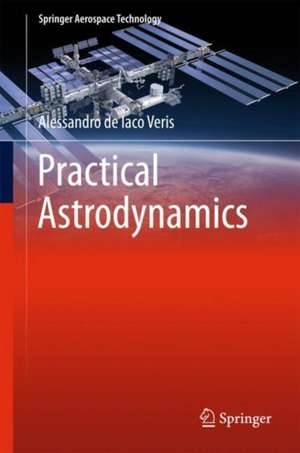Practical Astrodynamics: Springer Aerospace Technology
Autor Alessandro de Iaco Verisen Limba Engleză Hardback – 7 dec 2017
| Toate formatele și edițiile | Preț | Express |
|---|---|---|
| Paperback (1) | 697.08 lei 38-44 zile | |
| Springer International Publishing – 7 sep 2018 | 697.08 lei 38-44 zile | |
| Hardback (1) | 1611.32 lei 38-44 zile | |
| Springer International Publishing – 7 dec 2017 | 1611.32 lei 38-44 zile |
Din seria Springer Aerospace Technology
- 18%
 Preț: 944.19 lei
Preț: 944.19 lei - 18%
 Preț: 897.65 lei
Preț: 897.65 lei - 18%
 Preț: 782.42 lei
Preț: 782.42 lei - 18%
 Preț: 779.26 lei
Preț: 779.26 lei - 18%
 Preț: 1112.30 lei
Preț: 1112.30 lei -
 Preț: 366.33 lei
Preț: 366.33 lei - 18%
 Preț: 891.33 lei
Preț: 891.33 lei - 17%
 Preț: 489.87 lei
Preț: 489.87 lei - 18%
 Preț: 949.73 lei
Preț: 949.73 lei - 20%
 Preț: 629.52 lei
Preț: 629.52 lei - 15%
 Preț: 579.84 lei
Preț: 579.84 lei - 15%
 Preț: 583.78 lei
Preț: 583.78 lei - 24%
 Preț: 855.08 lei
Preț: 855.08 lei - 18%
 Preț: 947.35 lei
Preț: 947.35 lei - 18%
 Preț: 1112.60 lei
Preț: 1112.60 lei -
 Preț: 455.78 lei
Preț: 455.78 lei - 15%
 Preț: 581.98 lei
Preț: 581.98 lei - 18%
 Preț: 1112.15 lei
Preț: 1112.15 lei - 15%
 Preț: 578.87 lei
Preț: 578.87 lei - 18%
 Preț: 995.83 lei
Preț: 995.83 lei - 15%
 Preț: 635.01 lei
Preț: 635.01 lei - 18%
 Preț: 1406.03 lei
Preț: 1406.03 lei - 24%
 Preț: 1798.67 lei
Preț: 1798.67 lei - 15%
 Preț: 580.68 lei
Preț: 580.68 lei - 18%
 Preț: 943.88 lei
Preț: 943.88 lei - 15%
 Preț: 701.25 lei
Preț: 701.25 lei - 18%
 Preț: 896.21 lei
Preț: 896.21 lei - 15%
 Preț: 646.30 lei
Preț: 646.30 lei - 18%
 Preț: 947.35 lei
Preț: 947.35 lei - 15%
 Preț: 576.42 lei
Preț: 576.42 lei - 24%
 Preț: 1160.84 lei
Preț: 1160.84 lei - 15%
 Preț: 703.20 lei
Preț: 703.20 lei - 18%
 Preț: 992.49 lei
Preț: 992.49 lei - 18%
 Preț: 784.79 lei
Preț: 784.79 lei
Preț: 1611.32 lei
Preț vechi: 2092.62 lei
-23% Nou
Puncte Express: 2417
Preț estimativ în valută:
308.39€ • 320.72$ • 258.06£
308.39€ • 320.72$ • 258.06£
Carte tipărită la comandă
Livrare economică 11-17 martie
Preluare comenzi: 021 569.72.76
Specificații
ISBN-13: 9783319622194
ISBN-10: 3319622196
Pagini: 1309
Ilustrații: XIV, 1309 p. 359 illus., 100 illus. in color. In 2 volumes, not available separately.
Dimensiuni: 155 x 235 mm
Greutate: 12.76 kg
Ediția:1st ed. 2018
Editura: Springer International Publishing
Colecția Springer
Seria Springer Aerospace Technology
Locul publicării:Cham, Switzerland
ISBN-10: 3319622196
Pagini: 1309
Ilustrații: XIV, 1309 p. 359 illus., 100 illus. in color. In 2 volumes, not available separately.
Dimensiuni: 155 x 235 mm
Greutate: 12.76 kg
Ediția:1st ed. 2018
Editura: Springer International Publishing
Colecția Springer
Seria Springer Aerospace Technology
Locul publicării:Cham, Switzerland
Cuprins
Preface.- Chapter 1: The two-body problem.- Chapter 2: Orbit determination from observations.- Chapter 3: The central gravitational force and its perturbations.- Chapter 4: Impulsive orbital manoeuvres.- Chapter 5: Interplanetary trajectories.- Chapter 6: Numerical integration of the equations of motion.- Chapter 7: Dynamics of rigid bodies.- Chapter 8: Instruments for aerospace navigation.- Chapter 9: Attitude stabilisation and control of Earth satellites.- Chapter 10: Dynamics of spinning rockets.- Chapter 11: Performance and optimisation of rockets.
Notă biografică
Alessandro de Iaco Veris holds a degree in civil engineering and another in aerospace engineering, summa cum laude, from the University of Rome. He has also undertaken special training, including a high-level professional course on "Projet, calcul et emploi des fusées spatiales" at the Ecole Nationale Supérieure de l'Aéronautique et de l'Espace (ENSAE) and a course on "Dynamics of Controlled Structures" at the Massachusetts Institute of Technology (MIT). He is a strong proponent of the application of mathematics for practical purposes and in particular for the solution of problems arising in engineering. His experience is in the field of mathematical models and numerical methods for aerodynamics, space flight mechanics, system studies, and mission analysis. His professional interests focus on numerical integration methods used to predict the motion of space vehicles and Earth satellites subject to perturbations.
Textul de pe ultima copertă
This modern textbook guides the reader through the theory and practice of the motion and attitude control of space vehicles. It first presents the fundamental principles of spaceflight mechanics and then addresses more complex concepts and applications of perturbation theory, orbit determination and refinement, space propulsion, orbital maneuvers, interplanetary trajectories, gyroscope dynamics, attitude control, and rocket performance. Many algorithms used in the modern practice of trajectory computation are also provided. The numerical treatment of the equations of motion, the related methods, and the tables needed to use them receive particular emphasis. A large collection of bibliographical references (including books, articles, and items from the "gray literature") is provided at the end of each chapter, and attention is drawn to many internet resources available to the reader. The book will be of particular value to undergraduate and graduate students in aerospace engineering.
Caracteristici
Covers the theory and practice of the motion and altitude control of space vehicles Presents a multitude of step-by-step numerical examples Provides practical guidance on the solution of all exercises Includes numerous high-quality Illustrations that aid understanding of concepts Includes supplementary material: sn.pub/extras
